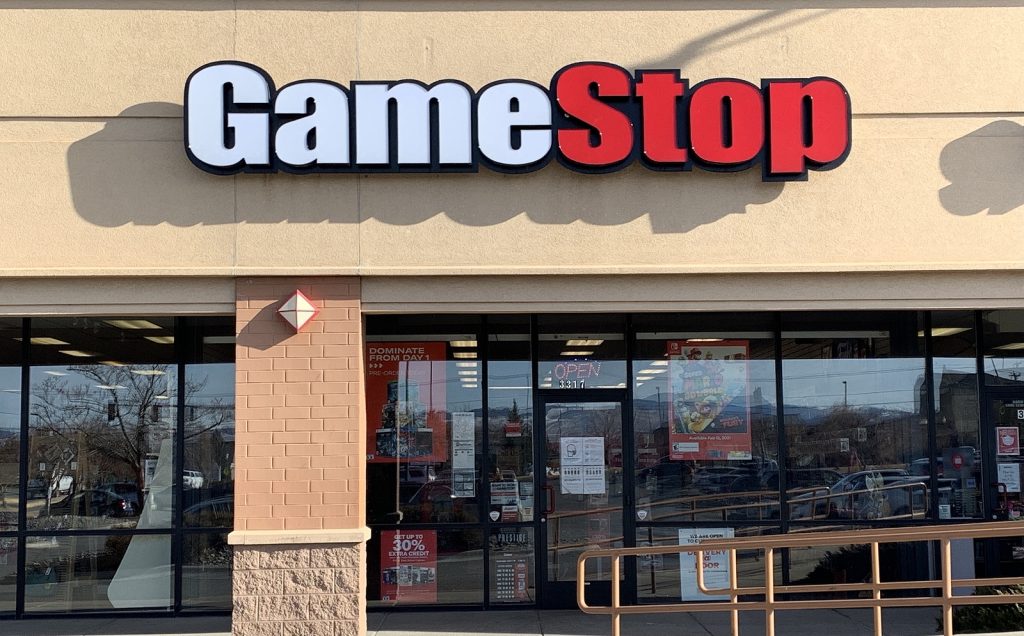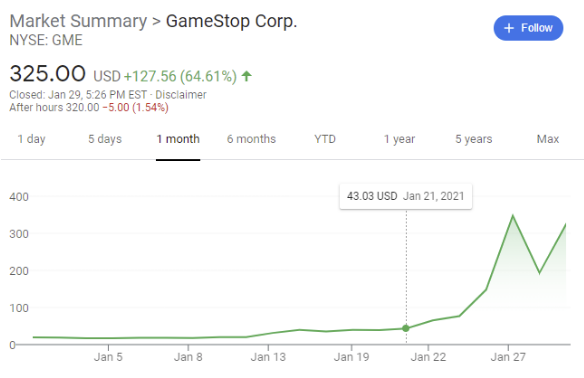- Free Strategy Session: (847) 906-3460 Tap Here to Call Us
GameStop & Robinhood

In recent days, I have been asked a lot of questions about GameStop trading and Robinhood. I have answered some of these questions in interviews available here:
- Is there a big SEC crackdown coming?
- Social media influence on the stock market
- Why GameStop Stock Exploding and What It Means For The Future
- Calls for SEC to Regulate Stock Market After Reddit Revolt
In this post, I am pulling together information for those who want to go deeper into the issues. I will start with an overview of what happened and then respond to some of the questions that I have been asked.
What is Happening With GameStop?
In a nutshell, major hedge funds placed large bets that GameStop’s stock price would fall. Those include Melvin Capital and a number of others. The hedge funds did this by “shorting” GameStop (GME) stock. They sold borrowed shares of GameStop shares expecting that the stock price of this brick-and-mortar corporation would continue to decline. This meant they would have to buy shares of GameStop to return to those who lent the shares. More on “shorting” stocks below.
A large group of individuals on a Reddit thread called r/wallstreetbets (which describes itself as “Like 4chan found a Bloomberg terminal illness) decided to “squeeze” the hedge funds by buying up GameStop shares. As a result of the increased demand for GameStop stock, the price of GameStop stock soared. That meant the hedge funds would have to pay more to purchase stock to cover their short positions. This resulted in some enormous losses for certain hedge funds, particularly Melvin Capital.

What makes this more complicated is that the price of a stock is not determined in the marketplace by supply and demand for the stock itself. Stock prices are also affected by options trading and short selling. You can buy an option to purchase stock in the future at a particular price – an exercise price. If the price of the stock is higher than the option exercise price, you make money. If not, you lose money.
What is “Shorting” a Stock?
Shorting a stock can significantly affect the price of a stock. A trader “shorts” a stock by borrowing shares from someone (often a mutual fund or pension fund) that it sells at the current market price. Not only does the short trader borrow the shares of stock, the trader also borrows money from a broker using margin. Under margin agreements, the brokerage firm can require that the hedge fund put up more money. If the stock price goes up, the brokerage firm might do that because it doesn’t want to get stuck with a debt that it cannot collect.
A short trader is betting that the price of a stock will go down before it has to purchase shares to return to its lender. A short position is profitable when the price of the stock goes down – the trader can purchase at a lower price the shares it needs to return to its lender. The more the price declines, the more profit a short trader makes.
In this simplified example, let’s say I borrowed shares of stock and sold them at the price of $100 per share. A few weeks later, I need to return the shares to whoever lent them to me. If I can buy them for $80 per share, I will make $20 per share on the trade. If I have to buy the shares for $120 per share, I will lose $20 per share on the trade.
Short selling is much riskier than traditional purchases of stocks because there is an unlimited risk if the price increases. If you purchase a share of stock for $100 in cash, the most you can lose is $100 if the stock price goes to zero. If you short a share of stock expecting it to drop below $100 there is really no limit on the amount of losses you could incur. You have the obligation to buy a share of stock – at whatever price – to return to whoever lent the share to you.
A short “squeeze” happens when traders who have a short position are faced with a rapid increase in the price of a stock that they have borrowed. When they buy shares of the stock to close out their positions (and limit their losses), they also drive the price of the stock up. While this short YouTube video has awful background music, it does explain in a nutshell a short squeeze. A short squeeze is not illegal. It is something that happens because of a rising price.
Did the Hedge Funds Break Any Laws?
It is hard to know if the hedge funds broker any laws. They engaged in short selling, which generally is legal. You can do it when you believe a stock is overvalued – the stock price is too high.
Although I have not seen any discussion of this yet, the hedge funds may be investigated for market manipulation. Anyone who has a large position has a powerful incentive to see the stock price go down. One thing we are likely to see is the hedge funds with large short positions being investigated for market manipulation. The Securities & Exchange Commission has prosecuted hedge funds and brokers for market manipulation in support of short positions.
What is Market Manipulation?
Market manipulation is a term of art under the securities laws. It is not enough that someone’s purchase or sale of a stock simply affects the price of a security. In order for illegal market manipulation to occur, the primary intent in entering into the transaction must be artificial manipulation of the price. That is true under Rule 10b-5 – the most well-known antifraud provision – as well as section 9(a)(2) of the Securities Exchange Act. Section 9(a)(2) makes it unlawful to engage in trades that raise or depress the price of a security “for the purpose of inducing the purchase or sale of such security by others.”
Market manipulation prosecutions are fraud prosecutions against traders who made money at the expense of unsuspecting investors or others through fraudulent or deceptive practices. The types of conduct that typically are charged as market manipulation are things like “wash sales”, “matched orders”, “marking the close”, “parking”, “painting the tape”, “spoofing”, or “pump-and-dump” schemes. These types of activities use misrepresentations and fraudulent practices to lead unsuspecting investors into trading that ultimately results in profits for the wrongdoers and losses for the unsuspecting investors.
Did the Reddit Traders Break the Law?
So far, it does not appear that the Reddit traders engaged in an illegal market manipulation. The securities laws prohibit market manipulation when it is misleading or fraudulent. Here the Reddit traders publicly disclosed their plan to purchase GameStop stock to squeeze the short sellers. This makes it hard to charge them with misleading or fraudulent conduct. Is it possible that the government will charge the Reddit traders? In my humble opinion, some of the Reddit traders are likely to get SEC subpoenas and be investigated but likely not charged because what they did was done out in the open.
In addition to the public nature of the Reddit traders conduct, some of the Reddit traders appear to have been making a political statement. They are upset about the uneven playing field and lack of transparency in the securities marketplace. The big players like hedge funds have structural advantages. Some of the Reddit traders have talked about how their families were unfairly devastated by the Great Recession while big banks were bailed out.
It is important to note that the victims of the GameStop trading are hedge funds. The question is should the government help hedge funds that are sophisticated players who knew the risks of a short squeeze. Hedge funds are not the most sympathetic people for the government to rescue, particularly when they have so many tax and structural advantages.
There are reports that at least one of the Reddit traders was a FINRA registered representative with Mass Mutual. This person is one of those most likely to be investigated for potential violations of FINRA rules. FINRA rules prohibit registered representatives from certain communications about securities with the public and other types of conduct. The Reddit traders who are registered financial professionals can expect to be subjected by the SEC to a more exacting standard than others. That may be why professional investor Chamath Palihapitiya, who made $500,000 in GameStop trading, says he is donating the profits.
In sum, I expect is the SEC will issue a bunch of subpoenas to the Reddit traders as well as to the hedge funds and Robinhood. Everyone is going to have to produce documents to the SEC and probably sit for testimony. Unfortunately, that means legal expenses.
Did Robinhood Do Anything Illegal When It would Not Let Folks Buy GameStop?
Many traders were outraged this past week when Robinhood and other brokers refused to allow them to buy more shares of GameStop. Robinhood backed off after a day or two and permitted its customers to purchase only one share of stock. Meanwhile, there is no evidence that the hedge funds that had shorted the stock faced any limitations on their ability to buy as much GameStop stock as they wanted. Many are outraged at Robinhood in particular, claiming that Robinhood sold out its retail customers.
This is an important thing for regulators to investigate. As a FINRA registered brokerage firm, Robinhood has a duty under FINRA rules to engage in just and equitable practices as well as comply with many other FINRA rules. Unfortunately, the regulators will take time to investigate and generally these investigations are non-public. As a result, even if Robinhood violated the securities laws or FINRA rules, it could take years before Robinhood is charged with wrongdoing.
To be fair, there may be legitimate reasons that Robinhood cut off its retail customers. It is possible that Robinhood had legitimate solvency concerns. Just like banks, brokerage firms are required to keep a certain amount of capital on hand to make sure they can carry out trades and other obligations. Because the price of GameStop went up so quickly, Robinhood’s trading obligations increased.
There is a lot that happens between the time your broker fills an order to buy or sell stock and the time it is “settled.” It may be fast and easy to submit a brokerage order using an app on your phone or computer, but there is a furious amount of work that happens behind the scenes to fulfill that order. Historically, this settlement window was three days because there was so much that clearinghouses had to do to process a trade. Although things are automated today, there remains a two-day settlement window. Read article. Typically, the settlement window and all the furious work behind the scenes does not matter to retail customers. Here those obscure activities could matter.
Brokerage firms execute trades through clearinghouses, which require the firm to keep a certain amount of money on hand (collateral) to ensure they can fulfill their trading obligations. The clearinghouse has the right to demand that a firm put up more collateral to protect the clearinghouse. That is because the clearinghouse has obligations to fulfill trades even if the brokerage firm fails to do so. When a stock is particularly volatile, the clearinghouse asks for more collateral to cover the increased risk. That seems to have happened to Robinhood and other brokerage firms. Read article.
Robinhood may have violated duties it owes to investors under FINRA rules or under its account agreement. In order to recover from Robinhood, a customer would have to bring an arbitration proceeding in FINRA Dispute Resolution. That is something that should be done through a lawyer and it is not the same thing as making a complaint to FINRA. A FINRA complaint is investigated by FINRA Enforcement Staff. FINRA Enforcement Staff do not represent the investor. In almost every case, to recover losses you must file an arbitration proceeding.
People often think that they can complain to FINRA and the problem will be resolved through mediation. That is not how it works. Brokerage firms are not interested in mediating until they have been sued in FINRA arbitration. Many brokerage firms wait until a month or two before the final hearings (i.e. trial) to enter into settlement negotiations or participate in a mediation. Mediation is not a short cut – it is a way to resolve claims in FINRA arbitration.
Finally, it may be hard to recover the full amount of losses in FINRA arbitration. While you may have suffered significant damages, FINRA arbitrators are trained that they can award “out of pocket” losses rather than full compensatory damages. As Professor Benjamin Edwards writes, you might be limited to recovering your “out of pocket” losses (which is the difference between the price at which you sold the stock minus the price at which you bought the stock).
If you have read this far, you should definitely check out Matt Levine’s Bloomberg columns including this one. Levine’s columns on this and other topics are insightful and entertaining to read. You should also read Morgan Housel’s incredible insights on the forces shaping this event and many others.
Please note that these are just my opinions and not legal advice. This is a rapidly developing story so stay tuned.























